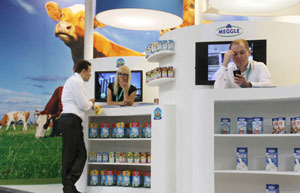Milking success with Chinese products in Africa
Updated: 2014-07-28 06:58
By Li Lianxing in Lagos, Nigeria (China Daily)
|
|||||||||||
Suleiman Solomon Aliu, marketing manager of Viju, says the company's success in the country has been helped by understanding the market and adjusting the company's strategies to take account of local conditions.
"This is the first of its kind in West Africa, and before 2004 Nigeria only had pure milk products. Over the past 10 years Viju's sales have grown gradually but rapidly, very much mirroring Nigeria's economic growth.
"We have four big competitors here, but Viju stands out because it has led the pack from the very beginning. Our daily sales are now 10 times bigger than what they used to be."
 |
"Unlike many other products in the market that only have sugar and water, our products have powder milk in them, with all the benefits to the body that this implies. That is something Nigerians highly value."
Viju's rise in sales has come on the back of hard work in adjusting and growing its distribution channels and networks.
"We don't sell our products directly to customers but local distributors," Hu says. "We now have more than 100 main distributors across the country, and we have many sub-distributors as well."
Aliu is in charge of 1,500 local staff and of opening new markets and liaising with distributors.
"Although we only need to deal with distributors, there can be conflicts between them and sub-distributors," Hu says."So local staff like Aliu can use their local knowledge and management skills to help Viju better develop its business."
Fourteen years ago, Viju's founder and chairman, Viju Wang Nianyong, was heavily involved in commodities trading. However, he realized that this business was unsustainable in the long term in Nigeria.
He then imported milk products popular in China at the time to test the Nigerian market. "Initially we gave away yogurt and milk beverages to Nigerians and found they preferred the milk ones," Hu says. "We targeted teenagers and then extended that to include more children."
In the beginning, the company produced just several dozen tons of daily products a day, and that has expanded to 400 tons a day now.
Related Stories
Chinese dairy firms catch private equity fancy 2014-07-05 06:40
Shengmu Organic Milk heads for HK 2014-07-04 21:03
Fonterra plans dairy farm hubs 2014-06-14 07:25
China tightens permits for baby formula producers 2014-05-30 14:02
Chinese demand keeps driving up New Zealand exports 2014-05-26 11:25
China's dairies facing fierce competition 2014-05-07 10:47
Today's Top News
Developers placing bets on casinos overseas
Scrutiny on iPhone data access
Russian fighter jet crash kills pilot
US-Russia relations frosty
Harsher safety measures urged amid scandal
Drills to have 'little impact' on civilian air services
Revision of decree protects military airports
Experts slam Japan's bid to break order
Hot Topics
Lunar probe , China growth forecasts, Emission rules get tougher, China seen through 'colored lens', International board,
Editor's Picks

|

|

|

|

|

|






